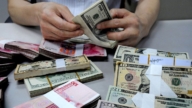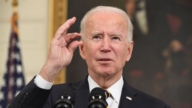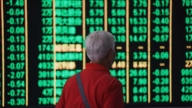【新唐人2014年03月08日訊】中共總理在《政府工作報告》中,有關經濟發展的目標前後矛盾,引起媒體和經濟學家廣泛關注。在雄心勃勃的任務清單中,最後關鍵問題還是落到了要把投資作為穩定經濟增長的關鍵。那麼,這麼多年來,靠投資拉動國內生產總值(GDP)帶來的大量浪費,和環境污染等諸多弊端的模式,為甚麼還是會定位為未來穩定經濟增長的關鍵呢? 我們來看看專家分析。
中共總理李克強在《政府工作報告》中,承諾保持快速增長、抑制通貨膨脹、創造1000萬個新的就業機會、遏制嚴重污染和應對不斷增長的金融風險、同時轉變中國的經濟增長模式。
李克強也承認,今年「確保中國經濟這艘巨輪行穩致遠」的任務,將是「艱鉅」的。李克強說,目前局面是「深層次矛盾凸顯」,「經濟下行壓力依然較大」。
在《政府工作報告》中,中共政府將增長目標維持在7.5%,要實現這個目標,李克強強調,要「把投資作為穩定經濟增長的關鍵」。
北京天則經濟研究所副所長馮興元:「基礎設施投資在經濟環境不好的時候,還是比較重要的,關鍵在於怎麼弄啦,很多項目在一個公平競爭的環境下,讓更多的民營企業同等的參與,但是現在這種司法、政府、地方的政府的權利沒有受到有效約束下,腐敗也是普遍存在的。 」
旅美經濟評論家傑森.馬:「只有高速增長的經濟,才能掩蓋它很多,比如房地產泡沫,地方政府債務等這樣的問題,另外也只有高速增長的經濟,才能保證官員不斷貪婪的錯事,不會和老百姓直接發生衝突。」
去年7月,諾貝爾經濟學獎得主,美國普林斯頓大學教授克魯格曼(Paul R. Krugman),在《紐約時報》,發表《中國經濟的龐氏騙局》文章中,指出中國經濟就像騎在一架自行車上,不前行就會倒下,現在中國這輛「 龐氏自行車」正衝向一堵牆。而中共政權的合法性主要是來自於經濟上的成功。
克魯格曼舉例說,中國企業正在瘋狂投資,可是投資不是用產能來服務消費者,現在在中國投資生產出來的產品,並無明確的最終買家。
多年從事中國經濟研究的美國資深經濟分析師簡天倫博士指出,騎過自行車的人都知道,速度越快,自行車越穩,而放慢速度騎,對控制自行車的人技術要求越高,越容易摔倒。中國經濟放緩後形成的鬼城、煤城,就是對克魯格曼說法的印證。
去年10月21號,中共總理李克強在一次經濟形勢報告中,解釋了中國在面臨經濟下行壓力時的困境。他也用「騎自行車」來比喻中國經濟的發展狀態,他說﹕「不動就會像騎自行車,會摔下來」。
由於前些年靠投資拉動國內生產總值(GDP),造成鋼鐵和其他建築相關產業的產能嚴重過剩。李克強表示,中國政府在今年就要淘汰鋼鐵2700萬噸、水泥4200萬噸、平板玻璃3500萬標準箱等落後產能。
李克強在《政府工作報告》承諾,維持GDP在7.5%的同時,全年家庭消費增長目標也保持在14.5%不變,但中國政府去年未能達到的這一目標,去年零售額僅增長13.1%。
傑森.馬:「中國的經濟你不能看它的指標,當然它的增長速度一定會實現,不管是統計局給它實現的,還是印鈔票、靠投資硬實現這個7.5%速度。他又要保證速度,同時他還希望改變中國的經濟結構,這樣的話,很可能將來出問題給社會造成的影響會更大,比如說地方債務還本上,金融體製出問題,他不得不大量開始印鈔票,結果就是老百姓面臨通脹,老百姓生活就會更加拮据。」
旅美經濟評論家馬傑森指出,中共用大量印製鈔票,製造通貨膨脹來解決問題,是最能矇騙老百姓的,物價上漲後,民眾想不到是政府發行過多鈔票引起的,而是指責商家賣的太貴。
採訪編輯/劉惠 後製/蕭宇
Why Can’t The Chinese Economy Rid Itself of Its Old Routine?
Inconsistencies in the Chinese Premier’s government work
report speech regarding economic development
has caused widespread concern among media and experts.
Investment is at the top of an ambitious task list
for maintaining economic growth.
For many years, China has used investment to drive
the GDP which has led to a lot of waste,
environmental pollution and other problems.
Why does China still use such a model
for the future economy?
Let’s take a look at expert analysis.
In the government work report given at the annual NPC
conference, Chinese Premier Li Keqiang promised
to maintain fast economic growth, curb inflation,
create 10 million new jobs, curb serious pollution,
cope with the growing financial risks,
and change China’s economic growth model.
Li Keqiang also admitted that the mission to “ensure
the long term stability of China’s economy is ‘daunting’."
“The deep-seated contradictions are highlighted" Li said
of current situation, and “the economic downward pressure
is still large".
In the government work report, the CCP government
set the economic growth goal at 7.5 percent.
In order to reach the goal, China needs to “set investment
as the key to maintain the stability of the economic growth",
Li remarked.
Deputy director of the Unirule Institute of Economics,
Feng Xingyuan: “Infrastructure investment is important
when the economic environment is not good.
The key is how to deal with it.
(It will be good,) if more private companies
are allowed to participate and compete
with each other in a fair environment
to bid on those projects.
But corruption is widespread without any valid restraint
to the power of judicial, government, and local government
nowadays."
Jason Ma, economic commentator based in the U.S.:
“Only a fast-growing economy can cover up
a large amount of problems such as real estate bubbles
and local government debts.
Also, only the fast-growing economy can avoid direct
conflict between the corrupt officials and the people."
Paul R. Krugman, Nobel Laureate in Economics,
and U.S. based Princeton University professor
published an article in The New York Times last July
titled “China’s Ponzi Bicycle Is Running Into A Brick Wall".
The article says China’s economy is “a bicycle economy
that falls over if it stops moving forward",
and the “bicycle is running into a brick wall".
The legitimacy of the Chinese Communist regime
mainly relies on its economic success.
Krugman made an example that Chinese businesses were
investing furiously, not to build capacity to serve consumers.
Ph.D. Jian Tianlun, a senior economic commentator based
in the U.S., pointed out that the faster a bike is,
the more stable, and more skills are needed to ride
a bike slowly in order not to fall.
Jian said the ghost cities and minery cities after the slowing
down of China’s economy proves Krugman’s words.
In an economic report dated Oct. 21, Prime Minister
Li Keqiang explained the difficulties of Chinese economy
as its faced with being swept downstream.
Li also used riding a bicycle as a metaphor, saying,
“(If the economy) doesn’t move, it will fall like riding a bike".
Relying on investment to push the GDP over the past
few years has led to serious excess capacity
of steel industry and other construction-related industries.
Li said the Chinese government will eliminate
27 million tons of iron and steel, 42 million tons of cement,
35 standard containers of flat glass,
and other backward production capacity.
In the report Li promised to maintain
a 7.5 percent growth in GDP,
and to maintain a 14.5 percent
annual household consumption growth.
Last year the Chinese government fell short of this year’s
goal with only a 13.1 percent of increase.
Jason Ma: “One can’t just look at the numbers to understand
the Chinese economy.
Growth will certainly appear, no matter if it’s with
the help of the Bureau of Statistics
or by printing money and investments
to reach the 7.5 percent.
(The Chinese government) wants to maintain
the speed of growth but also wants to change
China’s economic structure, which is likely
to bring negative impacts on the society.
For example, the local government debt is an issue
of the financial system, and then the government
had to print a large amount of money, which led to inflation,
and people’s lives are tighter."
Jason Ma indicated that the CCP’s excessive
money-printing, which is being used as a solution
to economic issues, has created inflation and deceived
the public.
The public isn’t aware that the government
is releasing too much money.
Instead, people blame businesses for setting
exorbitant prices.
Interview & Edit/Liu Hui Post-Production/Xiao Yu


























